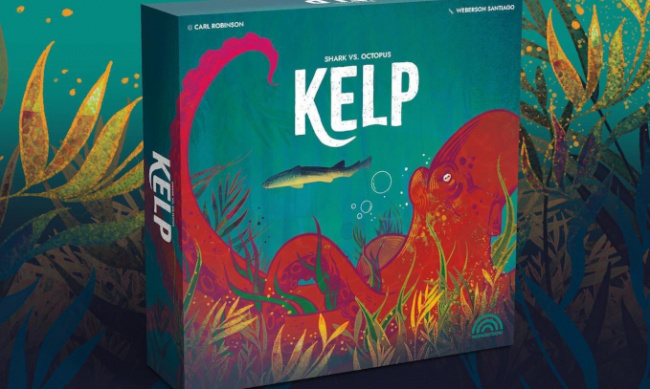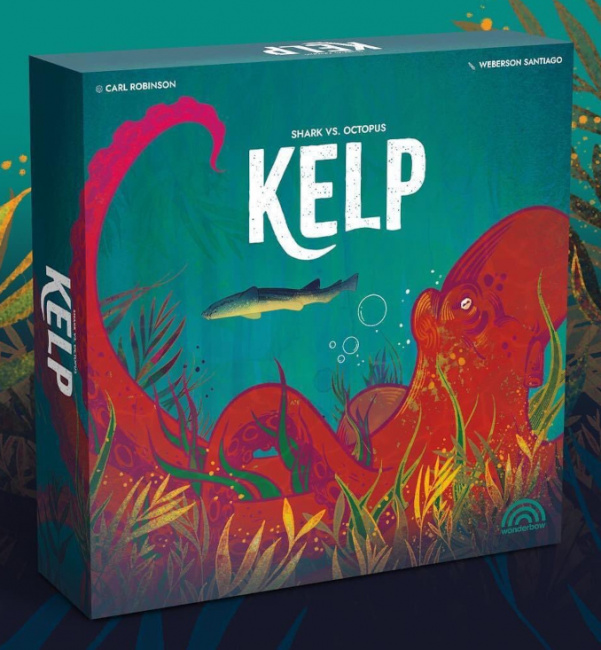Rolling for Initiative is a weekly column by Scott Thorne, PhD, owner of Castle Perilous Games & Books in Carbondale, Illinois and instructor in marketing at Southeast Missouri State University. This week, Thorne discusses the counterfeiting of Wonderbow Games' Kelp board game.
Board games have joined the ranks of items worthy of counterfeiting along with items such as sneakers, clothing, and computers, so much so that it had even made headlines at NPR. Wonderbow Games launched a very successful Kickstarter campaign for its undersea game Kelp: Shark vs. Octopus, which raised over $1.5 million. However, since the game is scheduled to ship this October, the company owners were very surprised to start receiving email complaints about the quality of the game components, asking for replacement parts and even the game manual.
A search of the Internet found several sites already selling the game on Amazon, eBay and other online platforms along with dozens of complaints about the quality of its components. However, it seems that Wonderbow’s continued complaints to Amazon and other platforms selling the fake games did have the desired effect. My quick search of Amazon and eBay this past weekend found no copies of the game up for sale.
I still find it strange that counterfeiters find making fake games worth the time and effort they put into them. Other games such as Machi Koro and Wingspan have also had problems with counterfeiting as well. From what I've read, though, the fake Kelp games came with tokens printed on one side, a Lego shark figure, and a board printed on heavy paper; all of which were packed in a box susceptible to easily getting crushed. Images for the counterfeits were likely pulled from the Kickstarter campaign or Tabletop Simulator, as I gather; neither had watermarked images. As a result of the widespread publicity this received, I expect we will see more companies using Kickstarter to place watermarks on the images they post on the website.
Several years ago, when Cards Against Humanity was extremely popular and stores could not keep the game in stock, counterfeit copies of the game were readily available on the Alibaba website. Those copies were indistinguishable from the original version and sold for significantly less than the legitimate version of the game. I knew a few retailers at the time that ordered and sold those versions, but Alibaba apparently received enough complaints over the years that the company has scrubbed the website of all Cards Against Humanity knockoffs.
With the explosion in crowd-funded board games over the past several years, the counterfeiters have moved onto higher ticket boardgames of which they can do a cheap print run, sell out of it, and move onto the next game before customers get the games, learn how shoddily made they are, and try to return them. When they can't return the game, the customer logs a complaint with the publisher, who then suffers the consequences of being perceived as selling a poorly produced product. The counterfeiter gets the money, and the publisher gets to deal with the mess.
As a result, we will likely see either more watermarked images of game components published, put out low resolution images of the components or as Stonemeier Games has chosen to do, avoid publishing images of their games until a month or so before the release date. It is a pain, and reduces the opportunities for publicizing the release, but in an era where more and more items are counterfeited, circumstances may demand it.
Comments? Send them to castleperilousgames@gmail.com.
The opinions expressed in this column are solely those of the writer, and do not necessarily reflect the views of the editorial staff of ICv2.com.

Column by Scott Thorne
Posted by Scott Thorne on January 29, 2024 @ 1:28 am CT




